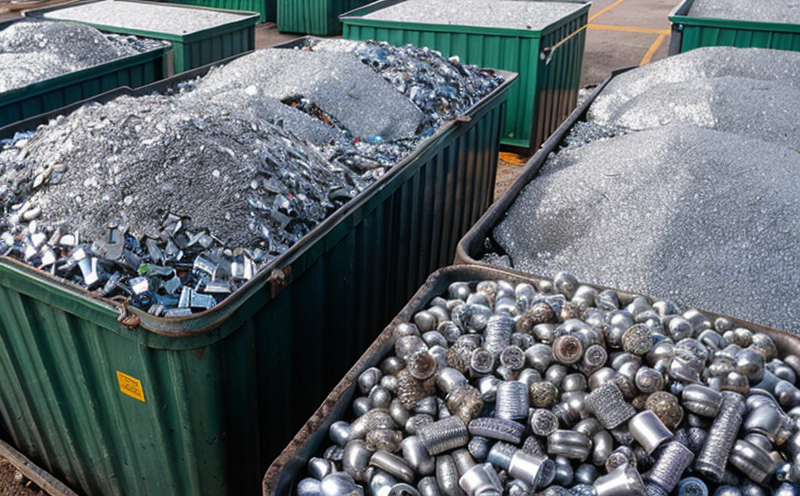EN 17410 Aluminum Scrap Radiation Detection
The European Standard EN 17410-3:2015 sets out the requirements for the detection of radioactive contamination in aluminum scrap. This service is crucial for ensuring that recycled materials meet safety and regulatory standards, particularly important given the increasing use of secondary aluminum in manufacturing.
The process involves rigorous testing to identify any radionuclides that might be present within the metal scraps. This includes not only identifying the presence but also quantifying the levels of radioactive contamination. The standard outlines specific methods for sample preparation and analysis, ensuring accuracy and consistency across different laboratories.
Testing is performed using specialized detection equipment designed to measure gamma radiation emitted by radionuclides in aluminum scrap. Compliance with this standard ensures that recycled aluminum products remain safe for use in various applications without posing risks to human health or the environment.
The service provided here ensures that all clients receive reliable results that can be used confidently when making decisions about product safety and compliance. By adhering strictly to EN 17410, we help our customers stay ahead of regulatory changes and maintain their reputation as industry leaders in sustainable practices.
The testing process begins with careful collection and preparation of the aluminum scrap samples. These samples are then analyzed using gamma spectroscopy techniques which allow for precise measurement of the amount of radiation emitted by different isotopes present within the material.
Accurate identification and quantification of radioactive contamination is essential in maintaining high standards of quality control during metal recycling processes. This service plays a vital role in ensuring that recycled aluminum remains safe for further processing into new products or end-use applications without compromising public health or environmental protection.
Environmental and Sustainability Contributions
Recycling aluminum offers significant benefits to the environment, including reduced energy consumption, lower greenhouse gas emissions, and conservation of natural resources. By providing reliable testing services that ensure compliance with international standards like EN 17410, we contribute positively towards these sustainability goals.
- Reduction in Energy Consumption: Producing new aluminum from bauxite ore requires substantial amounts of energy, especially when using the electrolytic process. Recycling one tonne of aluminum saves approximately 95% of the energy needed to produce it from raw materials.
- Emission Reduction: Recycling aluminum results in significant reductions in CO2 emissions compared to primary production methods. For instance, recycling just 1 kg of aluminum can save up to 60 kg of CO2 equivalent.
- Sustainable Resource Conservation: Aluminum is a non-renewable resource; by reusing existing scrap metal, we help preserve finite resources and reduce waste disposal issues associated with landfills.
The rigorous testing provided under EN 17410 ensures that recycled aluminum remains free from harmful contaminants such as radioactive materials. This not only enhances the safety of products derived from this material but also supports broader sustainability objectives by promoting responsible resource use and reducing environmental impact.
Competitive Advantage and Market Impact
- Predictive Compliance: By offering EN 17410 aluminum scrap radiation detection services, our clients gain a competitive edge by ensuring they are always ahead of potential regulatory changes.
- Informed Decision-Making: Our detailed reports provide actionable insights into the quality and safety of recycled materials. This information enables informed decision-making at various stages of production processes.
The demand for sustainable practices continues to grow among businesses worldwide, driven by increasing consumer awareness about environmental issues. Companies that demonstrate commitment to sustainability through reliable testing services like ours are likely to see enhanced brand loyalty and increased market share.
Moreover, compliance with international standards such as EN 17410 can open up new markets for our clients who may need to meet specific regulatory requirements in different regions. This helps expand business opportunities while maintaining consistent product quality across diverse geographical areas.
Use Cases and Application Examples
| Use Case | Description |
|---|---|
| Quality Assurance in Recycling Facilities: | Ensuring that recycled aluminum meets strict radiation detection standards before entering the manufacturing process. |
| Supply Chain Transparency: | Providing accurate information to stakeholders about the safety and quality of recycled materials used in their supply chains. |
| Product Safety Assurance: | Maintaining high standards of product safety for manufacturers who use recycled aluminum in consumer goods. |
| Compliance Audits: | Facilitating compliance audits to ensure ongoing adherence to international radiation detection standards. |
| Environmental Impact Assessment: | Evaluating the overall environmental impact of recycling operations, particularly focusing on minimizing radioactive contamination risks. |
| Sustainable Procurement: | Aiding procurement departments in selecting suppliers who adhere to stringent radiation detection practices for their recycled aluminum supplies. |
These use cases highlight the versatility and importance of our EN 17410 aluminum scrap radiation detection service in various contexts. From ensuring product safety to supporting sustainable procurement strategies, this service is integral to maintaining compliance with international standards while contributing positively towards environmental sustainability.





